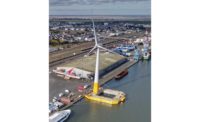Having seen one major offshore wind development shelved and failing to attract a single bid in the latest U.K. government auction for supply price contracts in September, officials have increased by 66% the maximum strike price for future projects. The government aims to have up to 50 GW of projects in place by 2030, with floating wind technology to be used in about 10% of those.
In a bid to catch up with rising construction prices and borrowing costs, the price cap for the next U.K. auction in March 2024 will rise to about $90 per Mwh for fixed-bottom offshore wind, and by 52% for floating projects to $218 per Mwh.
Strike price limits for geothermal, solar and tidal projects will rise by around 30%.
Announcing the subsidy rise, U.K. Energy Security Secretary Claire Coutinho said “there have been global challenges in this sector and our new annual auction allows us to reflect this."
Six developers had signed lease agreements in January for about 8 GW at six U.K. sites but all declined to bid on contracts-for-difference at government-capped prices of $55 per Mwh for fixed base installations and $145 per Mwh for floating platforms.
With the U.K. facing "intense international competition for investment," the trade body RenewableUK welcomed the price hike, said CEO Dan McGrail, a move that "demonstrates [the country] is intent on remaining a global leader in offshore wind, as well as in innovative technologies like floating wind and tidal stream.”
Calls for an adjustment in the U.K. government price mechanism were growing even before the September auction as capital costs soared and supply chain constraints grew, industry participants said.
Swedish state-controlled developer Vattenfall AB announced in July termination of its 1.8-GW Norfolk Boreas project off England's east coast, writing off $530 million in costs and termination fees. It cited rising construction costs affecting what was set to be one of Europe’s largest offshore wind projects.
Keith Anderson, CEO of ScottishPower, welcomed the news of the government price increase, but cautioned that ”the real test … will come when the overall budget for the next auction round is set next year.”
Industry participants also will need to include in their applications for the 2025 U.K. auction newly released government guidance that add review criteria based "on how much a project strengthens the environmental and economic sustainability of the industry," including "how supply chains affect jobs and communities.”





